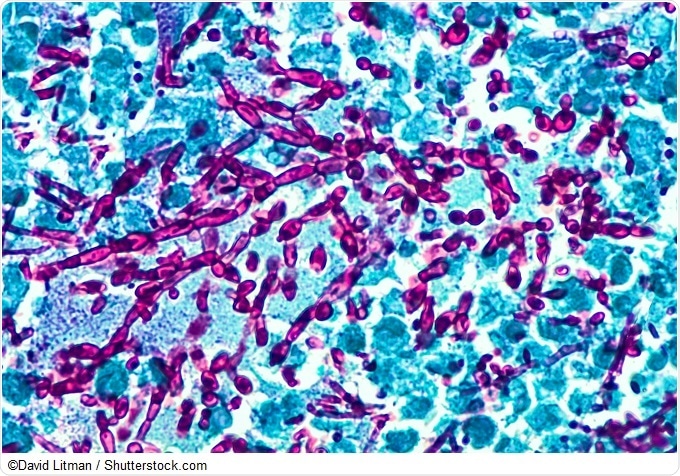Oral thrush refers to the infection of the mouth with the fungus Candida albicans. The condition, which is also referred to as oral candidiasis, causes white plaques that resemble cottage cheese to form on the tongue, on the inside of the cheeks and sometimes on the tonsils, gums and the back of the throat. In some cases, oral thrush can spread down into the esophagus which can cause difficulty eating and swallowing.

Image: Budding yeast and pseudohyphae of Candida albicans, stained with periodic acid-Schiff (PAS) stain.
Low levels of Candida albicans are present naturally in the mouth of healthy individuals, but they are usually kept in check by the immune system, which maintains a healthy balance of good and bad microbes in the body. However, certain factors such as illness, the use of certain medications, stress or poor oral hygiene can disrupt this microbial balance and lead to overgrowth of the fungus, in which case, symptoms may develop.
Treatment
The condition is not contagious and can usually be treated with antifungal medication, taken over the course of 10 to 14 days. Depending on the patient’s age and the underlying cause, medication may take the form of liquids or gels (topical medications) that can be applied to the inside of the mouth or, in some cases, tablets or capsules may be prescribed. These medications do not usually cause side effects, although some people may experience nausea, diarrhea, abdominal bloating and pain.
Prevention
Taking the following measures can help reduce the risk of oral thrush developing:
- Brushing regularly: The teeth should be brushed at least twice a day with a fluoride toothpaste, and flossed at least once a day. If a person has no or few teeth or wears dentures, the gums, tongue and insides of the cheeks should be gently brushed twice a day. Mouthwashes and mouthsprays should be avoided as they disrupt the microbial balance in the mouth.
- Cleaning dentures: Dentures should be cleaned every day. A dentist can advise on how different types of dentures should be cleaned. Dentures should be removed from the mouth before bedtime, cleaned with denture paste or soapy water, and then left to soak in a denture-cleaning solution overnight.
- Attending dental appointments regularly: Dental check-ups should be attended regularly, even when a person has no or few teeth. It is especially important for people who wear dentures or who have diabetes (see below) to attend dental appointments regularly.
- Keeping diabetes under control: Saliva with a high sugar content provides a favorable environment for the growth of Candida albicans. Individuals with diabetes should therefore keep their blood sugar level under control, to reduce the amount of sugar in their saliva.
- Taking care what you eat: Eating foods rich in sugar and yeast can also encourage Candida growth, so the intake of foods such as bread, beer and wine should be limited.
- Rinsing the mouth after corticosteroid inhalation: People who use a corticosteroid inhaler for asthma should rinse their mouth and brush their teeth afterwards. Inhaled corticosteroids depress the immune system in the lungs to help prevent the inflammation that causes asthma. Unfortunately, they often also disrupt immune mechanisms in the throat that keep Candida albicans in check. The patient should be instructed to rinse out the mouth with water thoroughly after inhalation of such drugs, and a spacer should be used during inhalation.
- Treating vaginal thrush: Vaginal thrush and oral thrush are both caused by Candida albicans overgrowth. Although a vaginal yeast infection is not dangerous, a woman can pass on the yeast to her baby during birth, in which case the baby may develop oral thrush. It is therefore important to ensure any vaginal thrush is treated.
- Stopping smoking: Inhaled tobacco smoke dries the mouth and disrupts the microbial balance which can lead to overgrowth of Candida.
References
Further Reading
Last Updated: Feb 27, 2019